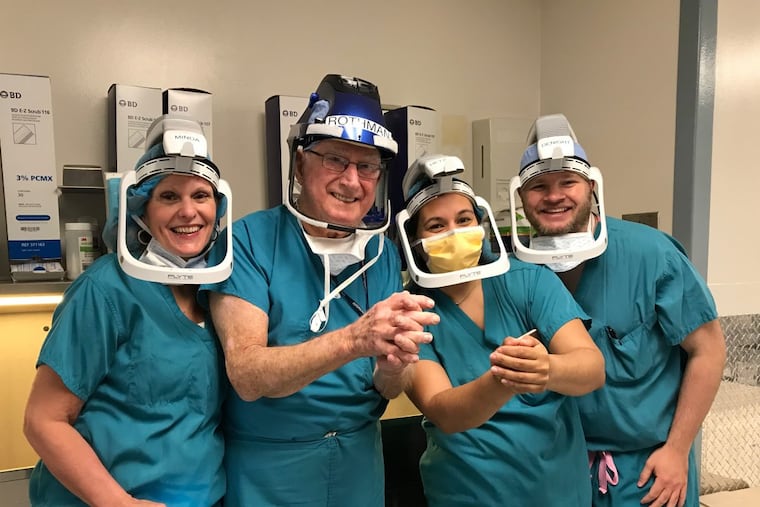At 81, orthopedics pioneer Richard Rothman gives up surgery - but will never stop working
This is not a retirement. Rothman still has big plans.

After 50 years in the operating room and as many as 50,000 knee and hip replacements, famed orthopedic surgeon Richard Rothman has finally decided to stop operating at age 81½.
Last Wednesday, he did his final five knee replacements. Then, he threw out the old Mephisto loafers he wore in the OR and gave up his keys to the OR office he shared with Alexander Vaccaro, president of the Rothman Institute, the huge orthopedic practice that Rothman founded.
Rothman kept his blue scrubs. "That's my lounging outfit," he said.
In his executive office in Philadelphia this week, Rothman talked a little wistfully about giving up the word surgeon as a key part of his identity. While he is looking forward to not having to get up at 4:30 a.m. on surgery days, he has no plans to quit working. He still expects to work 60 hours a week, seeing patients before and after surgery, consulting with colleagues, teaching, working with a venture capital firm in New York, and helping two Chinese firms in which he is a minority investor. One manufactures orthopedic implants and the other is a group of private hospitals. Vaccaro has asked Rothman to help with mergers and acquisitions in the ever-expanding practice, which now has 171 physicians.
Rothman said he will now identify himself as a "health-care entrepreneur."
>>Read more: Doctors are staying in practice longer. Is that a good thing?
The obvious question is, "Why now?" Rothman did not have a ready answer.
It was not, he said, because he was bored. "I never did get bored, because I didn't look at it as just a bone-and-joint operation," he said. "I looked at it as a people operation. What we do changes people's lives."
Nor was it because he — or anyone else — thought his performance was slipping. Because he continued to operate at an age long past when most surgeons quit, he asked fellow surgeons to evaluate his work and tell him if they thought it was deteriorating. He kept measuring indicators of quality: blood loss during surgery, operative time, readmission rates, complications, nerve injuries. "Everything I'm measuring has not diminished in the last 15 to 20 years," he said. "I watch it like a hawk."
His health and energy remain good, he said. But his wife, Marsha, encouraged him to quit. "She has watched people stay in the game too long," he said. So has he. He thought of himself as an aging boxer who might last an additional two years in the ring, but could end up blind and brain-damaged. "I think the ideal situation is to stop operating when you are still at your peak rather than wait for lack of strength or lack of courage or judgment," he said.
More important, he was aware that some patients have complications after surgery no matter how skilled their surgeon. As his 82nd birthday loomed in December, he worried that anyone who did poorly might be inclined to blame his age. "I am very conscious of perception," he said.
Vaccaro said it was a sad moment when Rothman handed him the office key. After procedures, the two men had discussed religion, politics, life, surgery, and business. It's tough watching a mentor retire, he said. "You feel like you've lost a part of your soul."
Vaccaro thinks Rothman will be just as important and effective in his next phase as he was while performing surgery. Most surgeons, he said, immerse themselves in new activities when they quit and find that, after a few months, they don't miss surgery.
As for that OR office, Vaccaro said it may take him a year to figure out who — if anyone — gets to occupy that space. "It takes a very special person to fill that chair," he said.
Clearly, Rothman is not one who dreams of a life on the golf course. Nor would his wife want him around the house all day, he said. He thinks work is good for him. He's a fan of mental exercise and says there's no better intellectual challenge than human interaction. "The best mind game," he said, "is dealing with people."
His goal is to work to the end. "If I have my choice," he said, "I'd like to work in the morning and die in the afternoon."
But, not soon.